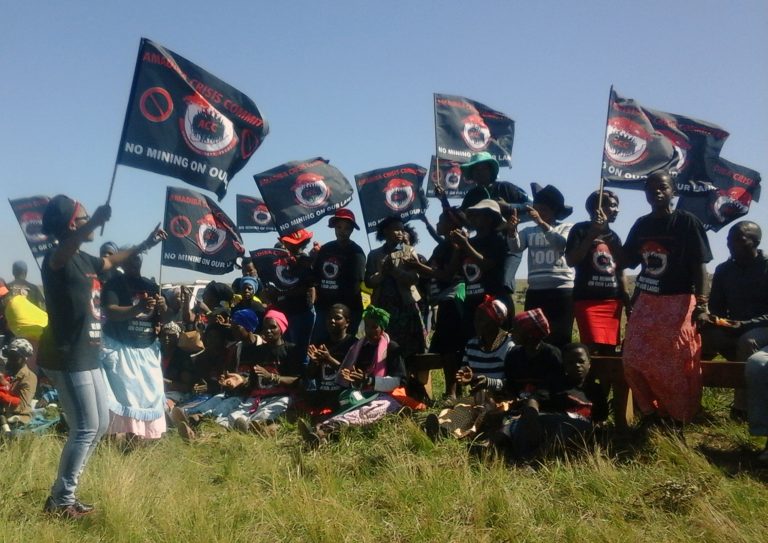by MARK OLALDE
 Residents of the Eastern Cape’s Amadiba coastal area gather in September 2015. Many fear mining would threaten their way of life by destroying grazing land and creating rifts in the community. PHOTO/Nonhle Mbuthuma
Residents of the Eastern Cape’s Amadiba coastal area gather in September 2015. Many fear mining would threaten their way of life by destroying grazing land and creating rifts in the community. PHOTO/Nonhle Mbuthuma
South Africans await judgement to be handed down in a court case that could set a sweeping precedent by empowering communities on communal land with the right to reject new mining projects.
Calling the case a referendum on “the right to say no,” residents of several rural villages along the country’s eastern coast are asking the court to reinterpret current minerals extraction legislation to compel mining companies to gain explicit community consent prior to breaking ground on new operations.
The court case, for which arguments were heard in late April in Pretoria, stems from a dispute over a proposed titanium mine that has raged for more than a decade in the country’s rural Eastern Cape province in an area known as the “Wild Coast.” The project has pitted Australian mining company Mineral Commodities Ltd against a group of five local villages, collectively known as Amadiba. Locals consistently turned back the company’s attempts to mine, but bouts of violence have left several people dead.
“Their way of life is intrinsically linked to the land. Customary communities tend to suffer disproportionately from the impacts of mining,” the plaintiffs argued in their submission to the court, noting environmental degradation, displacement and loss of agricultural land. “Without free, prior and informed consent, they are at real risk of losing not only rights in their land, but their very way of being.”
Nonhle Mbuthuma is the secretary and acting leader of the Amadiba Crisis Committee, which represents many residents of the villages. She took over the group’s mantle of leadership when the committee’s chairperson, Sikhosiphi ‘Bazooka’ Radebe, was gunned down in front of his home in March 2016. Radebe was widely thought to have been murdered for his activism against the mine, and Mbuthuma’s name is believed to be written on a hit list alongside his.
“The land is our identity. When we lose that land, we lose who we are. And when you lose who you are, that’s no different than just someone killing you,” Mbuthuma said.
The communities and civil society organizations that have joined the plaintiffs asked that if the court does not side with their argument for consent, that it at least grants them the ability to negotiate terms such as royalties prior to mining. If the court declines that too, then the plaintiffs asked that the current legislation be found unconstitutional.
In the court filings, a subsidiary of Mineral Commodities argued that the plaintiffs misinterpreted the law well beyond its intended purpose in an effort to halt the mine, which already earned permits. The company noted that “if granted, [the plaintiffs’ application] will affect land and mining rights all over the country.”
“We hope that if the judge rules in favor of us, it will help all African communities, not only Xolobeni, because the problem of mining pushing people off their land is all over Africa,” Mbuthuma said, referencing one of the five villages in Amadiba that has become synonymous with the conflict.
Formerly under the control of the oppressive apartheid system, South Africa democratically elected a new government in 1994, which worked to return the country’s mineral wealth to its citizens while also fitting into international, capitalist markets. Under current legislation, mineral rights were claimed for the state in an attempt to foster economic development.
Toward Freedom for more
